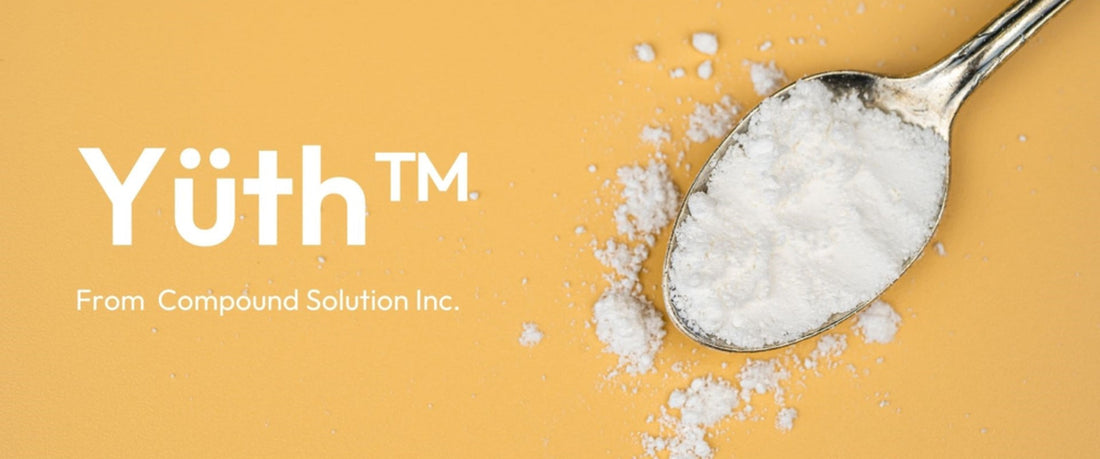
In the conversation around healthy aging, scientists have been exploring how naturally occurring compounds influence cellular processes. One of the most studied is spermidine, a polyamine present in all living cells. Yüth™, a patent pending product of Compound Solutions Inc. (CA, USA), draws inspiration from this growing body of research.
What is Yüth™?
Yüth™ is formulated with spermidine, a compound that has been widely investigated for its connection to autophagy—the cellular process that recycles damaged components. Research suggests spermidine may help maintain cellular balance by influencing these recycling pathways (Eisenberg et al., 2009; Madeo et al., 2018).
By highlighting spermidine’s role in cellular studies, Yüth™ represents a science-inspired ingredient designed to complement wellness routines that focus on healthy aging.
What is Spermidine?
Spermidine is a naturally occurring polyamine found in plants, animals, and humans. It plays a fundamental role in cell growth, differentiation, and maintenance (Madeo et al., 2018).
Recent research has shown that spermidine can induce autophagy in model organisms, a process linked to healthier cellular function and extended lifespan in these systems (Eisenberg et al., 2009). Observational studies in humans also suggest that higher dietary intake of spermidine is associated with lower overall mortality (Kiechl et al., 2018). While more research is needed, these findings highlight spermidine’s potential relevance in the field of healthy aging.
The Benefits of Yüth™
- Cellular Renewal
Spermidine has been studied for its potential role in supporting cellular recycling processes such as autophagy, which may contribute to maintaining healthy cell activity (Eisenberg et al., 2009; Madeo et al., 2018). - Heart Health
Research in both animal models and human cohorts has investigated spermidine intake in relation to cardiovascular function and markers of healthy aging (Eisenberg et al., 2016). - Brain Function
Preclinical studies have examined spermidine for its potential role in memory and cognitive processes through autophagy-related pathways (Gupta et al., 2013). - Longevity
In model organisms, spermidine supplementation has been shown to extend lifespan (Eisenberg et al., 2009). Population-based research has also reported associations between higher dietary intake and lower mortality in humans, though more evidence is needed to confirm causality (Kiechl et al., 2018).
Experience the Science of Yüth™
Aging is a natural process, and supporting cellular function has become a focus of modern nutritional science. Yüth™ reflects this research by drawing on spermidine’s well-documented role in cellular recycling, cardiovascular health markers, cognitive processes, and healthy aging.
References
1. Madeo, F., Eisenberg, T., Pietrocola, F., & Kroemer, G. (2018). Spermidine in health and disease. Science, 359(6374), eaan2788. https://doi.org/10.1126/science.aan2788
2. Eisenberg, T., Knauer, H., Schauer, A., Büttner, S., Ruckenstuhl, C., Carmona-Gutierrez, D., ... & Madeo, F. (2009). Induction of autophagy by spermidine promotes longevity. Nature Cell Biology, 11(11), 1305–1314. https://doi.org/10.1038/ncb1975
3. Eisenberg, T., Abdellatif, M., Schroeder, S., Primessnig, U., Stekovic, S., Pendl, T., ... & Madeo, F. (2016). Cardioprotection and lifespan extension by the natural polyamine spermidine. Nature Medicine, 22(12), 1428–1438. https://doi.org/10.1038/nm.4222
4. Gupta, V. K., Scheunemann, L., Eisenberg, T., Mertel, S., Bhukel, A., Koemans, T. S., ... & Sigrist, S. J. (2013). Restoring polyamines protects from age-induced memory impairment in an autophagy-dependent manner. Nature Neuroscience, 16(10), 1453–1460. https://doi.org/10.1038/nn.3512
5. Kiechl, S., Pechlaner, R., Willeit, P., Notdurfter, M., Paulweber, B., Willeit, K., ... & Willeit, J. (2018). Higher spermidine intake is linked to lower mortality: A prospective population-based study. The American Journal of Clinical Nutrition, 108(2), 371–380. https://doi.org/10.1093/ajcn/nqy102
This content is for educational purposes only. These statements have not been evaluated by the Food and Drug Administration. This product is not intended to diagnose, treat, cure, or prevent any disease.